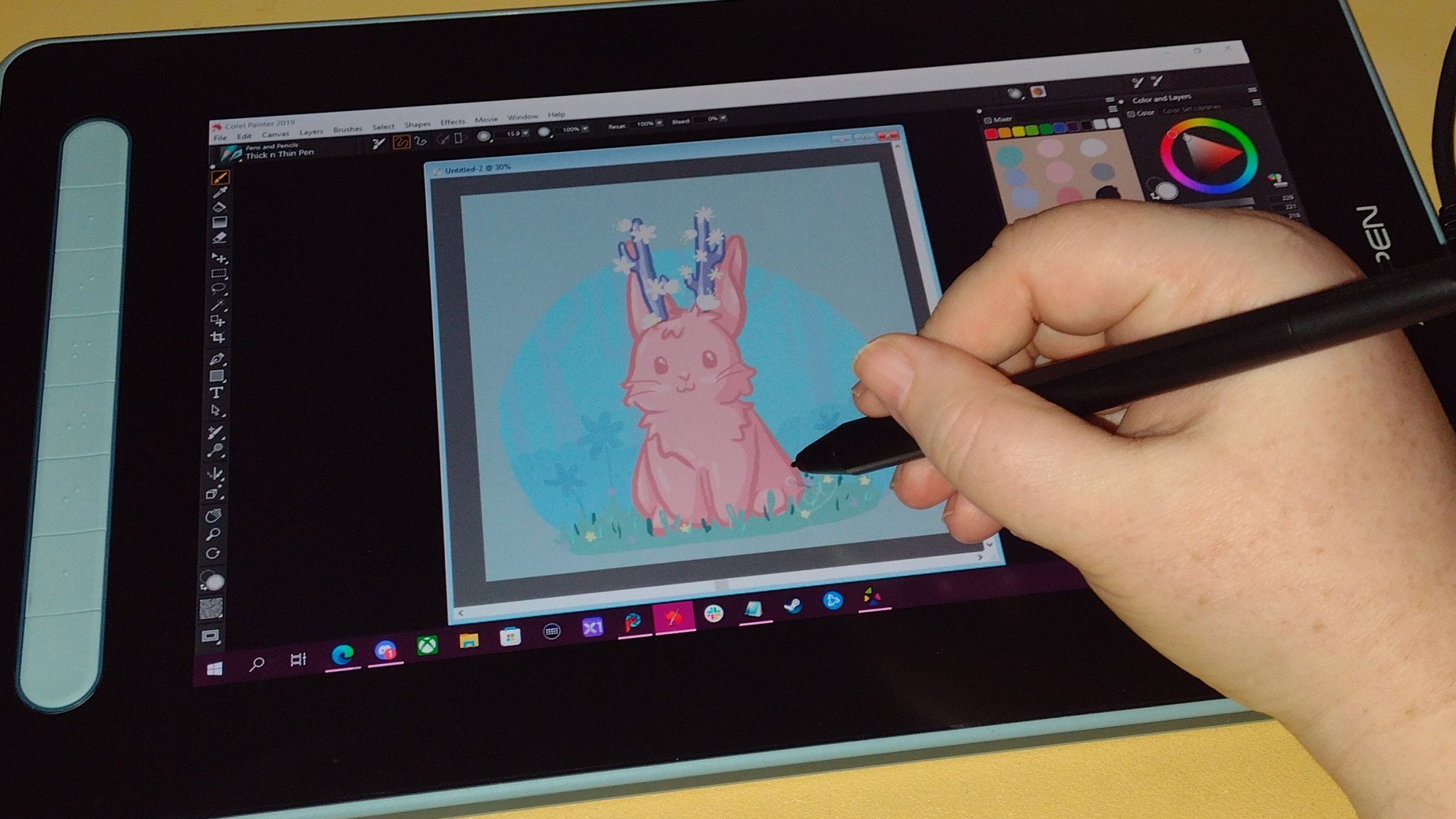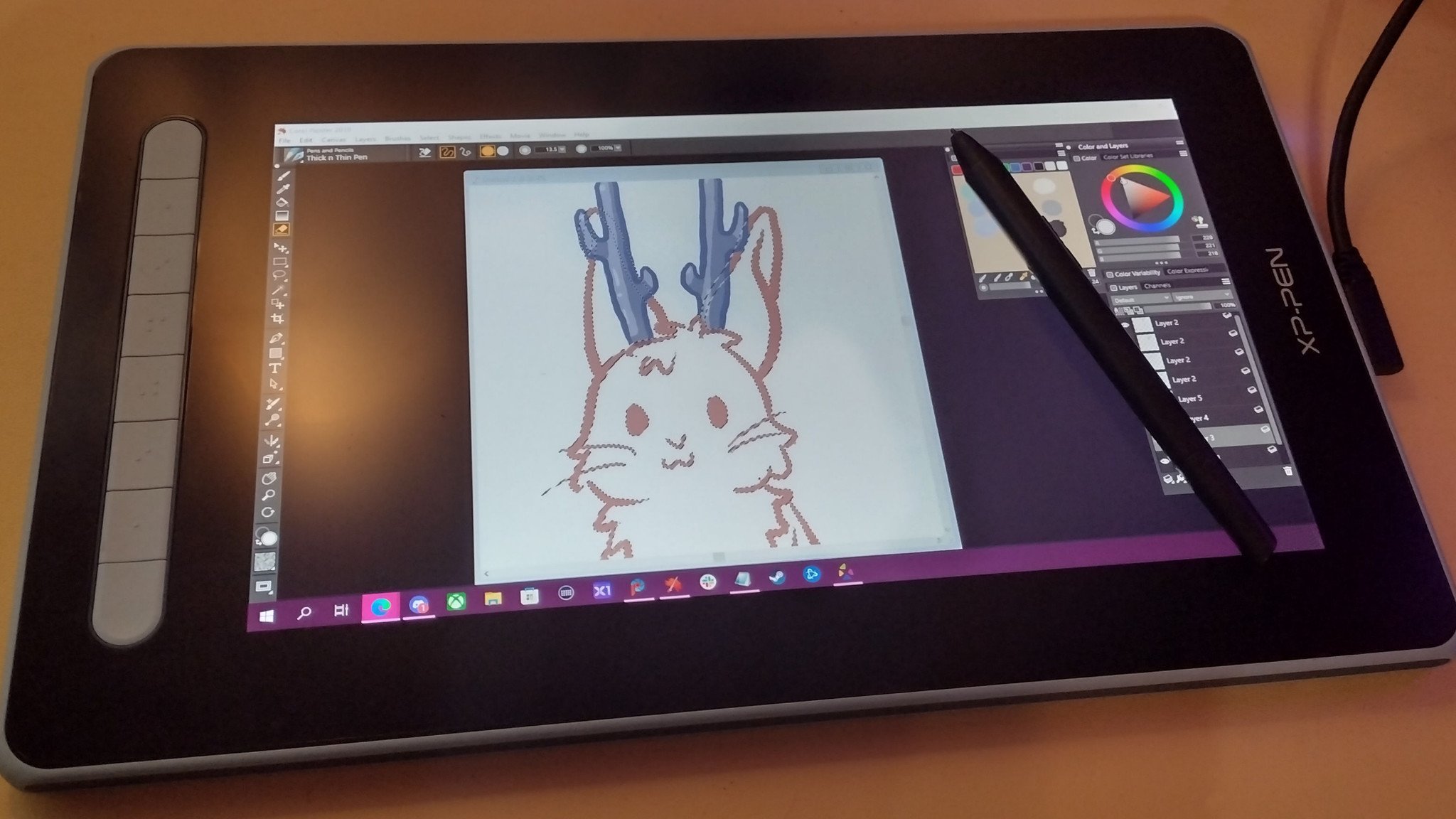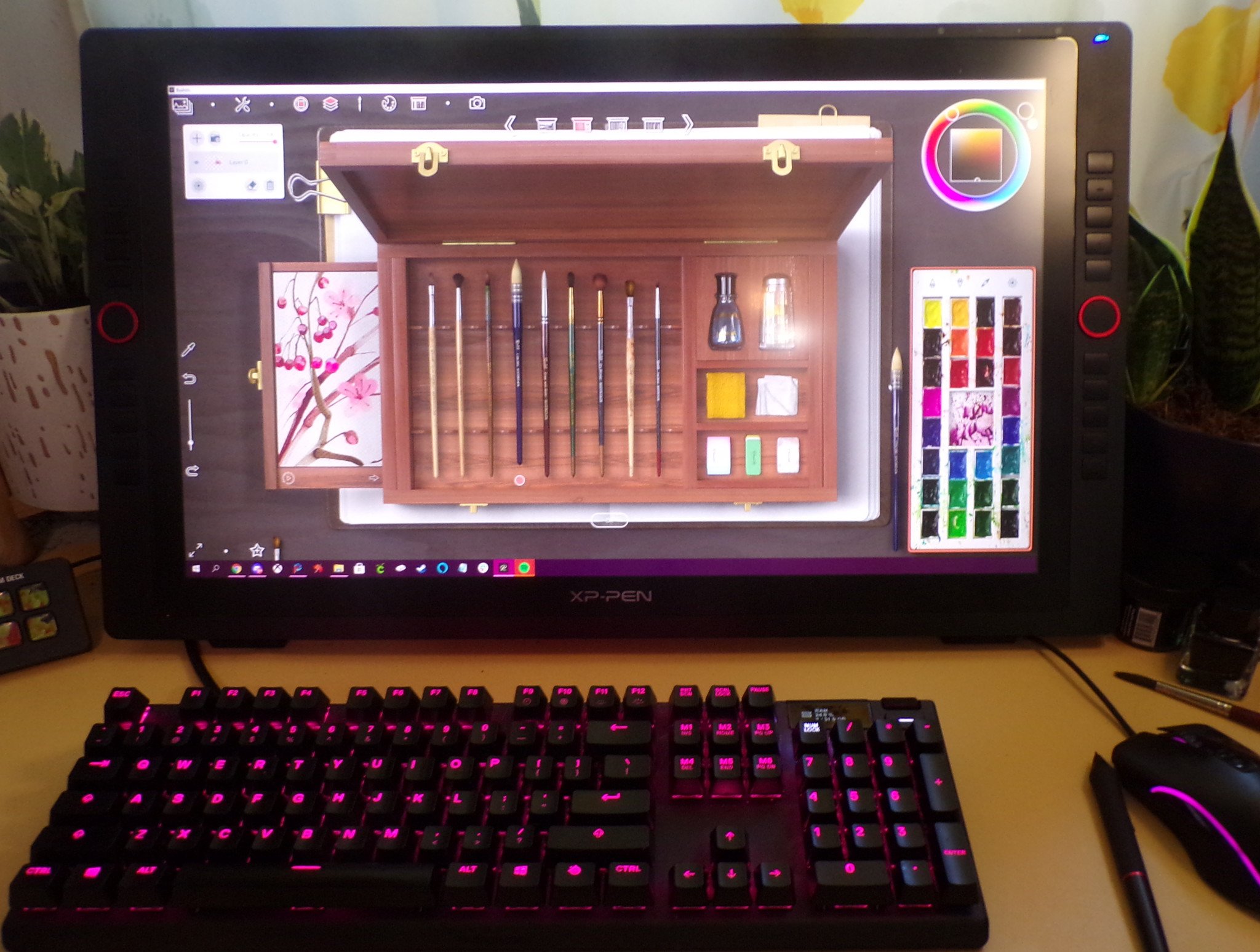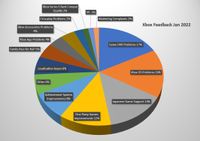 Source: Windows Central
Source: Windows Central
For an artist looking to get started with digital art, there can be a bit of sticker shock once you start shopping for a pen display. There has been a bit of a push in the market from makers like XP-Pen to produce quality, budget-friendly drawing accessories as we see with their Artist 12 and 16 series of pen displays.
The road for these devices has not been a smooth one, however, as they typically need to cut corners with oft-requested features in a bid to keep the price low. We see this even in XP-Pen’s release of the second-generation Artist 12 pen display. XP-Pen manages to make some impressive leaps with their newer technology in both the pen stylus and the display itself, but there are some features missing for these little powerhouse pen displays to remain budget friendly.

XP-Pen Artist 12 (2nd Gen)
Bottom line: The XP-Pen Artist 12 (2nd Gen) is a powerful and portable pen display for artists on a budget. The fully laminated screen finally brings the XP-Pen displays up to par with comparable devices from other brands, while the newly designed stylus feels comfortable and responsive.
The Good
- Fully laminated screen
- Portable
- USB-C connectivity
- Available in different colors
The Bad
- Small work area
- Pen jitter
- Lacking accessories
XP-Pen Artist 12 (2nd Gen): Price and availability

XP-Pen’s Artist 12 (2nd Gen) pen display is reasonably priced at $250, putting it in line with comparable pen displays from competitors. The Artist 12 can be purchased directly from XP-Pen’s storefront on their website, or via Amazon. Oddly enough, the 2nd-generation Artist 12 cannot be purchased at other online retailers like Newegg or Best Buy, even though the first generation of the pen display is more widely available.
XP-Pen Artist 12 (2nd Gen): What’s good

An XP-Pen Artist 24 Pro has been living on my desk for several months now, serving as both a secondary monitor and my primary drawing device. It’s only fair to say, then, that the Artist 12 (2nd Gen) had some pretty big shoes to fill if it was going to find its way into my workflow. Coming in at nearly half the size with its 12-inch frame, the Artist 12 only offers 11.6 inches of workable drawing surface. Big things do come in small packages, though, and the Artist 12 more than makes up for its smaller size by being feature rich.
The XP-Pen Artist 12 may be a budget pen display, but upon first pickup it is immediately obvious that the construction materials were not cheap. There’s a bit of weight to the display, and it doesn’t flex or wobble in your hands. You can easily lay the display on your lap, against the edge of your desk, or propped up on some other surface. It’s safe to move the tablet about freely while using it without fear of bowing and some sort of damage. It is an overall solidly built display that you can feel comfortable about slipping into your laptop bag and taking with you. The Artist 12 (2nd Gen) takes advantage of USB-C connectivity for power, increasing the display’s portability as it does not need an additional power source to use.

Not only does the build quality of the Artist 12 feel good, but it looks good, too. XP-Pen had previously introduced colorful casings to their Deco line of graphic tablets, and now that color lineup has been extended to the Artist 12 displays. The Artist 12 is available in classic black, or a blend of muted and pastel blue, pink, or green colors. All four color options are the same price, which means you free to express your color preference without having to cough up extra for the dreaded pink tax.
The Artist 12 more than makes up for its smaller size by being feature rich.
For the screen, the XP-Pen Artist 12 is fully laminated, giving it a nice matte finish that reduces glare from any surrounding light sources. The laminated screen has a slight bit of texture to it, similar to hot press watercolor paper. It’s not enough to change how you may move your pen about the screen, but the little bit of resistance provided for the stylus does more closely mimic the feeling of actual pen and paper. Full lamination lends the tablet a more natural feel when in use, as well as helping to close the parallax gap between where the tip of the pen touches and where the cursor is displayed below it. The IPS 1080p display offers 127% sRGB color accuracy, ensuring your images are clear and that your images will retain their color vibrancy should you choose to print.

On the left hand side of the tablet are eight customizable express keys. While most tablets include stickers to label the express keys, XP-Pen has decided to vary the texture of the keys between being smooth and braille-like bumps so that the user can determine which key their hand is on without having to divert their eyes from the screen as they work. For those who are left-hand dominant, the Artist 12 can be rotated 180 degrees and the location of the express keys changed within the software. Adaptability and accessibility is always nice.
The newly redesigned stylus for the Artist 12 may easily be one of the most comfortable pens I’ve used to date. It sheds the chunky barrel weight of previous Artist styli, opting instead for a slimmer, more natural-feeling pen. The pen is also a solid one-piece design with a simple rocker-style button that can be customized via XP-Pen’s software.

XP-Pen’s software has long been the bane of the brand, but with each new cycle of tablets the driver UI has seen dramatic improvements. The Artist series driver UI has been reworked to increase user friendliness, with settings being broken into categories for the work area, pen settings, and shortcut keys. This allows the user to calibrate the screen to match their specific workspace scenario and computer setup. Express keys can be customized on a per application basis or just for the device overall, and there is a wide range of options covering both mouse and keyboard inputs that can be routed to them.
XP-Pen Artist 12 (2nd Gen): What’s not good

XP-Pen has had a long, rocky history with their tablets, and while I’m content to heap praise on how far their devices have come since their initial lineup, it would be disingenuous of me to turn a blind eye to the issues that still remain even with their newer products. The XP-Pen Artist 12 is functionally a wonderful pen display, but one of its biggest pressing issues is its size. XP-Pen sells the Artist 12 alongside an Artist 13, Artist 15.6, Artist Pro 16, and Artist Pro 16TP. While a 12-inch pen display is certainly going to earn good marks for portability, it is hard to sell when the 15- and 16-inch displays also exist. Sixteen inches is often considered the “sweet spot” for a lot of digital artists when it comes to pen displays, and you could opt for a similarly featured Artist 15.6 pen display for just $50 more.
The Artist 12’s budget-conscious design also negatively impacts the included accessories. Typically, pen displays (and even graphic tablets without displays) will include a variety of pack-ins such as an anti-fouling glove, pen case and nibs, and all necessary cables. While a nib pull ring and replacement pen nibs are included in the box, the ring itself is loose and the nibs are packaged together in a small plastic bag. There is also no included travel bag, which is something widely included in the competition’s pack-ins and therefore an unusual item to forgo, particularly when the product itself is otherwise perfectly designed for portability.

Also noticeably lacking from the Artist 12’s packaging is the USB-C to USB-C cable. The included cabling is a USB-C split into a 3-point connection, two USB-As and an HDMI port, which is certainly a useful cable to have for those without USB-c connectivity. Unfortunately, XP-Pen has opted instead to sell the USB-C cables separately, and at a markup nearly double of what you can find one for at a local big box store. There is also no display stand included with the Artist 12, as XP-Pen sells those independently for an additional $20-40 fee.
Despite it being my favorite XP-Pen styli design to date, the included pen for the Artist 12 could benefit from a dedicated eraser button on the tip. This is an ongoing complaint of mine with XP-Pen and other budget drawing displays. An eraser button on the stylus is something that is viable for budget tablets because we’ve seen XP-Pen’s sister brand, Xencelabs, include it with its stylus. In use, the Artist 12 stylus delivers on the majority of its promises, offering tilt functionality and 8192 pressure levels.

XP-Pen does market the stylus as having new technology in the form of the X3 chip, which is supposed to double the pen’s lifetime and increase its sensitivity. Users who do not put a lot of pressure on the pen while drawing will need to use the settings to adjust the pressure curve of their own stylus. While testing this display, I did have issues with the driver UI not saving my preferred pressure curve between PC start-ups, requiring me to reload and adjust my curve before use every time.
There was also a considerable amount of pen jitter — inconsistent wobbles in the line — when making slow, long strokes with the pen. To an extent, software can nullify these pen jitters with stroke smoothing, but the general method for dealing with this is to make large, fast strokes while illustrating. Because of the overall size limitations of the Artist 12 workspace however, it can be difficult to do so.
XP-Pen Artist 12 (2nd Gen): Competition

While Wacom continues to sit atop the mountain of pen displays as the undisputed front-runner, there has been massive strides made by companies like XP-Pen and Huion looking to introduce some much-needed competition to the space. Wacom tablets are incredibly cost prohibitive to new artists and hobbyists just looking to get started with digital imaging, and in the more portable pen display space someone would be limited to the Wacom One tablet.
The Artist 12 (2nd Gen) marks a big step up for XP-Pen.
A Wacom One does come with the benefit of having purchased a display from an established brand with a long history of creating pen displays. There is certainly a positive to knowing that the drivers are going to already have had all the kinks worked out. The One also has a slight size bump over the XP-Pen Artist 12, coming in at 13.3 inches for the display. However, it does lack the express key functionality that is included on the Artist 12. There is an additional express key remote available for the One, but it comes with a lofty $100 price tag on top of the $300 the pen display itself costs.
More similar to XP-Pen with regard to budget consciousness, Huion offers a 12-inch pen display that boasts nearly all the same features as the Artist 12 2nd Gen. Huion’s 12-inch KAMVAS tablet includes a fully laminated screen, battery-free pen, and tops out at the $250 mark. However, the Huion KAMVAS 12 does offer one advantage over the XP-Pen Artist 12, as it includes an integrated stand built into the display so that it can be adjusted and tilted more easily while drawing.
XP-Pen Artist 12 (2nd Gen): Should you buy it?

You should buy this if …
- You want a portable pen display option
- You are a beginner or hobby artist just starting with digital
- You are on a tight budget
You shouldn’t buy this if …
- You already have a larger pen display unit
- You have the option to go with a 16-inch display instead
While I found the Artist 12 (2nd Gen) to be a fully functional tool for creating digital art, its limited workspace was difficult to adjust down to after having spent so much time with a much larger pen display. However, for a beginner artist or a hobbyist who is just looking to dabble with digital art, the XP-Pen Artist 12 could be a perfect addition to their workflow. The pen display excels at providing on-the-go creativity that can connect to a myriad of devices from laptops to tablets and cellphones, as well as working well with a variety of digital art apps.
The Artist 12 (2nd Gen) marks a big step for XP-Pen to catch up to what some of their competitors have been doing in the budget pen display market. Huion’s KAMVAS line, for example, has had a couple of generations of pen displays featuring fully laminated screens, whereas XP-Pen has only just started to implement this feature properly among their Artist series pen displays.
Even though they’re playing a bit of catch-up in the technology race, it still gives me hope to see that they are continuing to progress. The jump to full lamination along with the potential for 4k monitor releases in the future (as seen in the Artist Pro 16TP) leads me to hope there’s more innovation to look forward to in the future. If nothing else, maybe we’ll continue to see more colorful hardware.

XP-Pen Artist 12 (2nd Gen)
Bottom line: The Artist 12 (2nd Gen) is a reasonably priced and well-designed pen display that is a great starter tablet for beginners and hobbyists. While it may not replace a larger pen display in an everyday work setup, it is a great second tablet to have on hand for on-the-go creativity.
We may earn a commission for purchases using our links. Learn more.

Analysis: The top issues Xbox fans want fixed in 2022 and beyond
Recently, I took to Twitter to solicit feedback on the current status of the Xbox platform in general. A (wholly unscientific) analysis of over 1,000 tweets gives us a glimpse into the major pain points Xbox core fans still think need to be fixed and improved throughout the next year.



